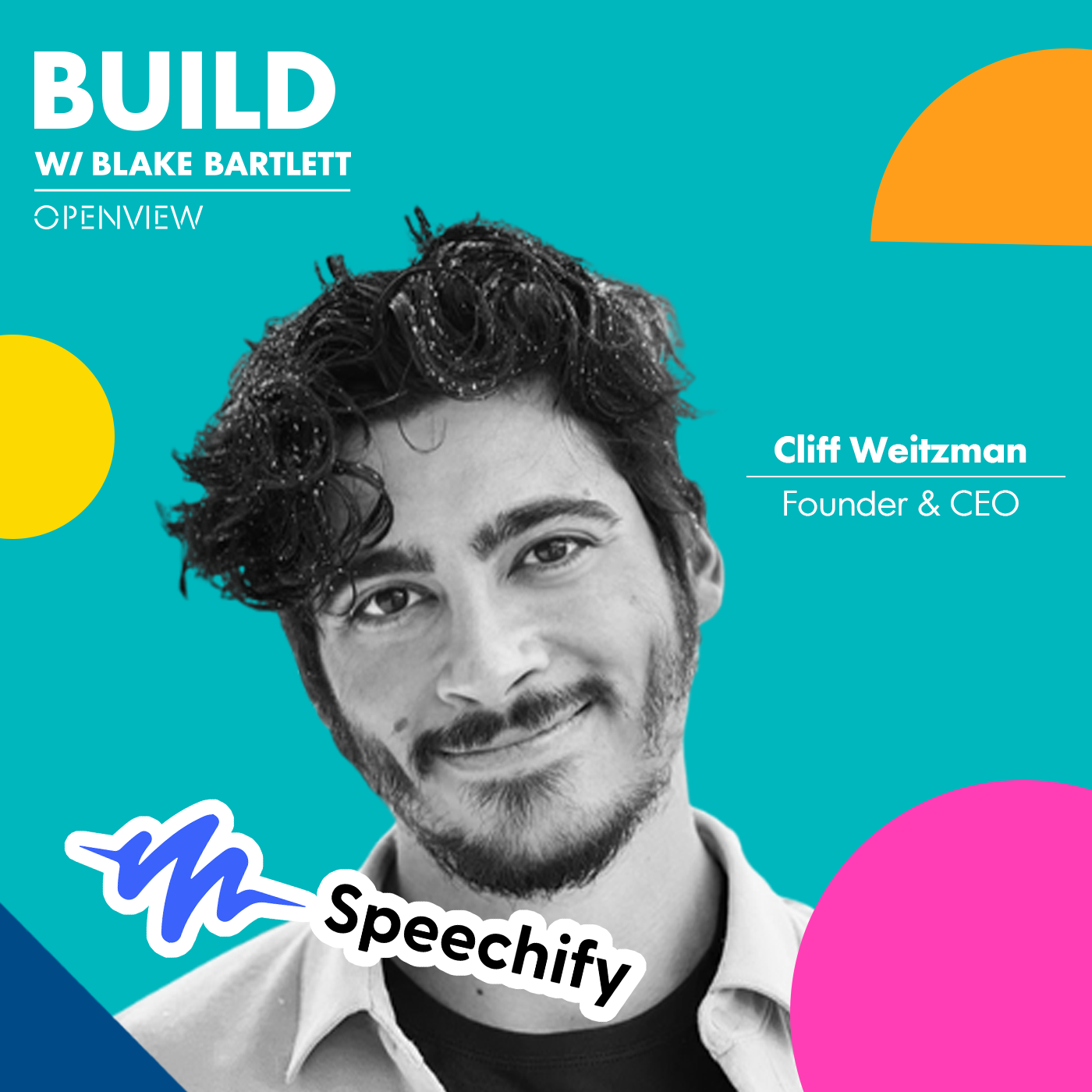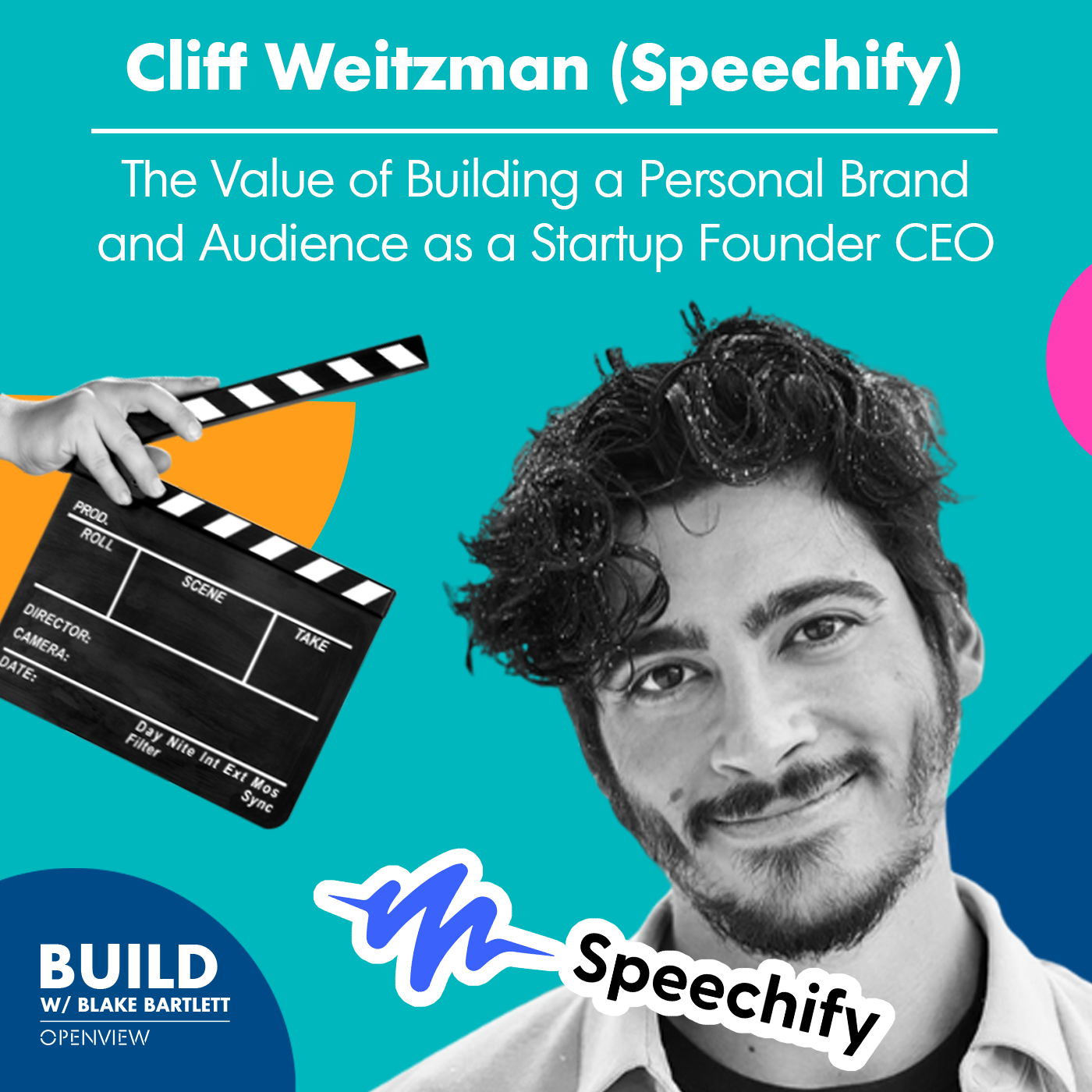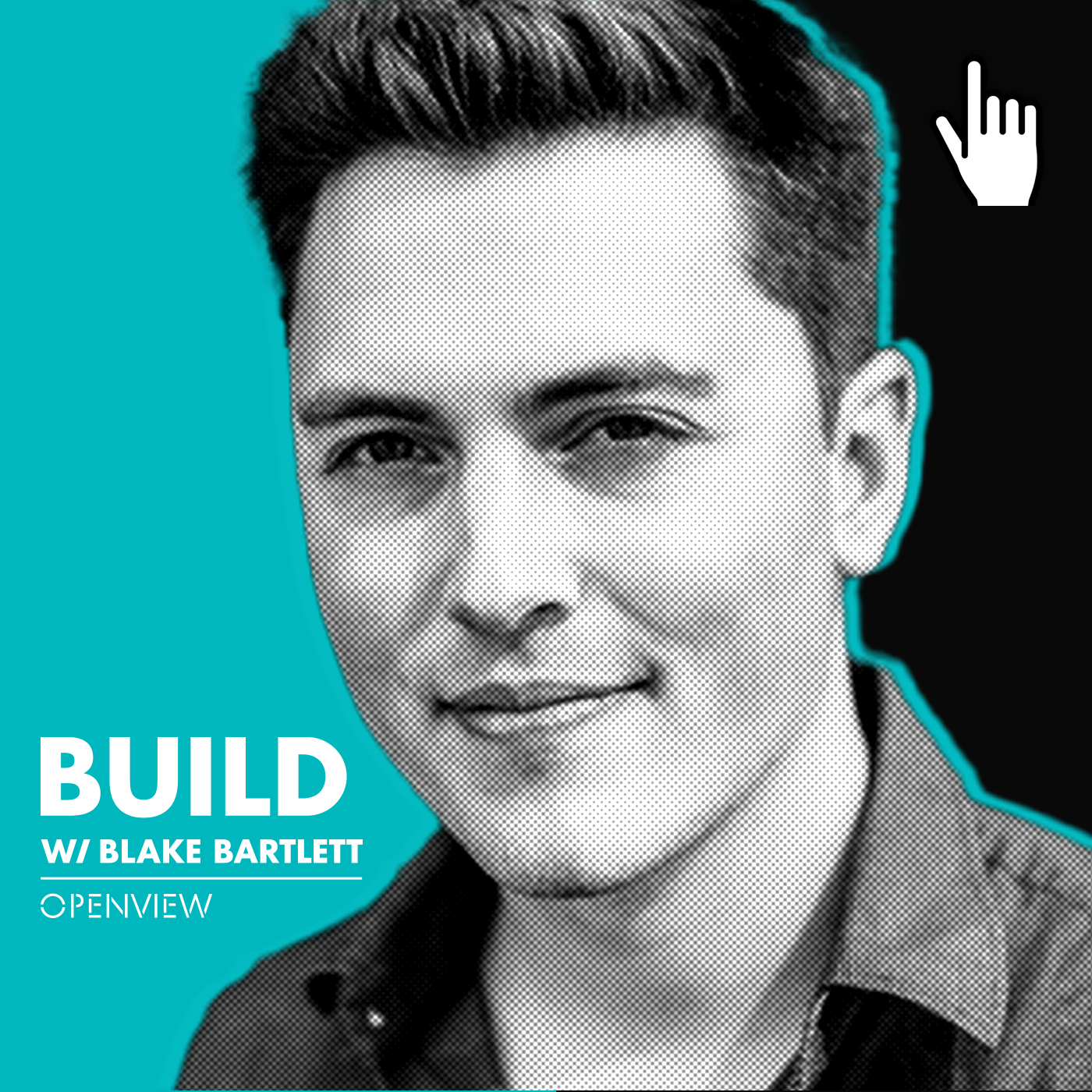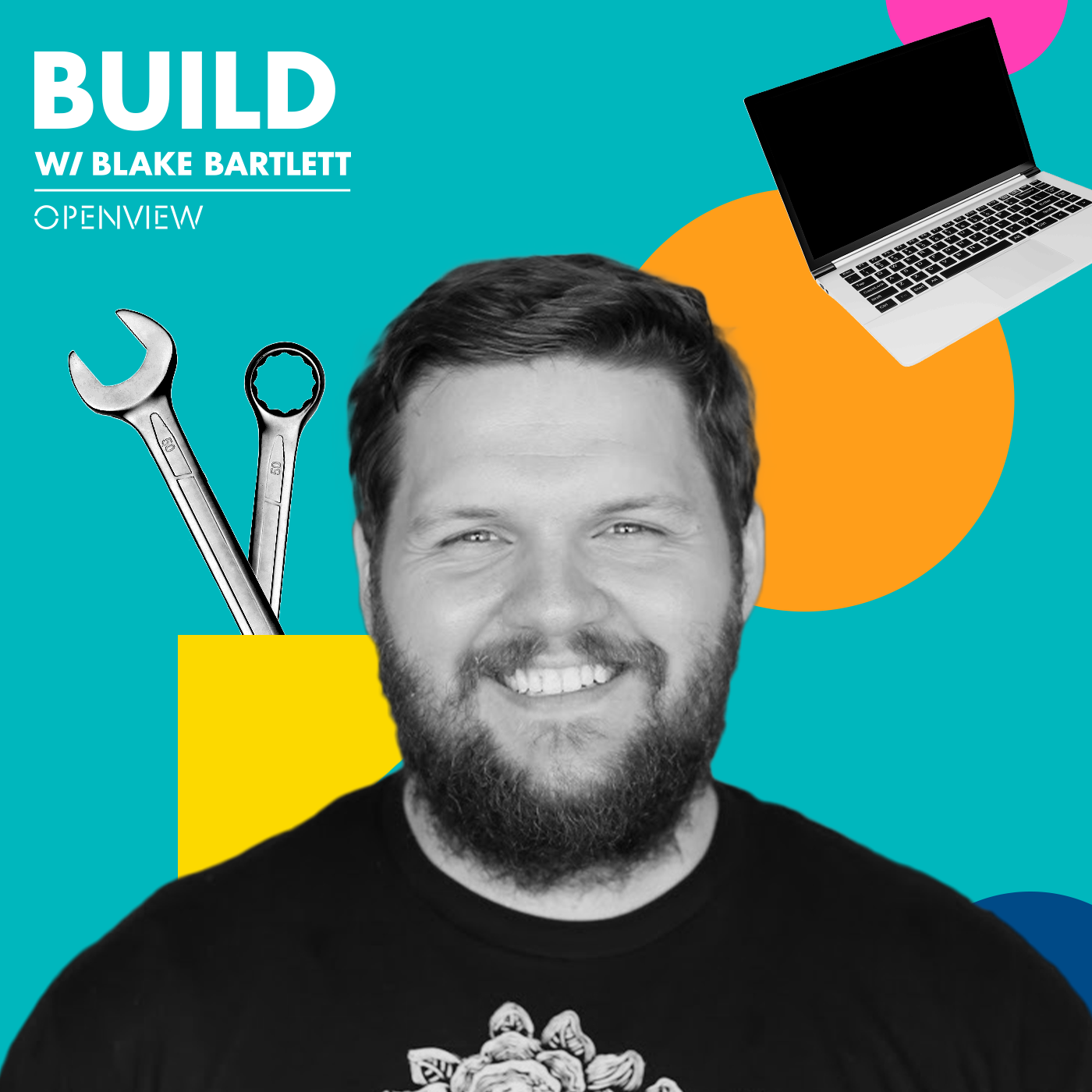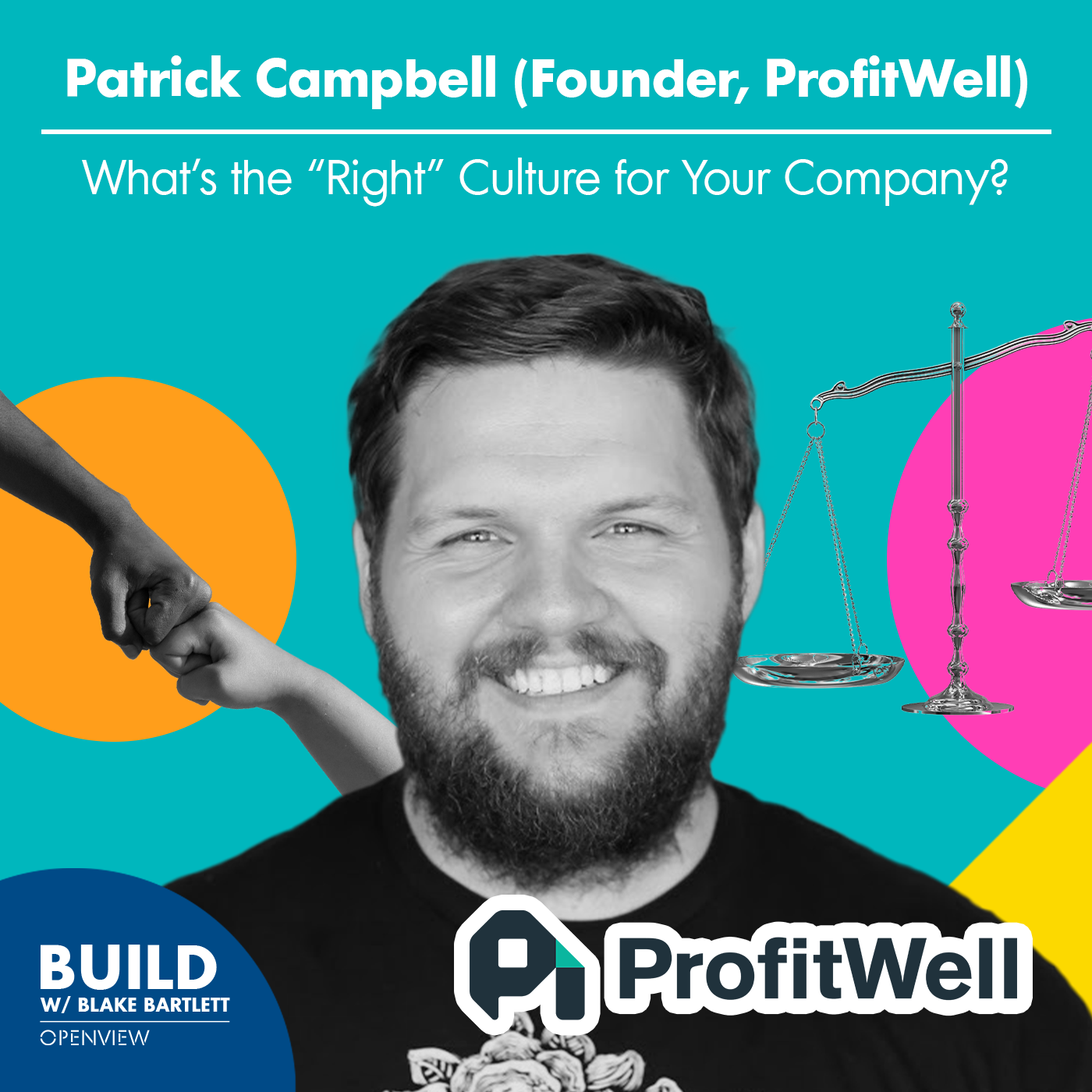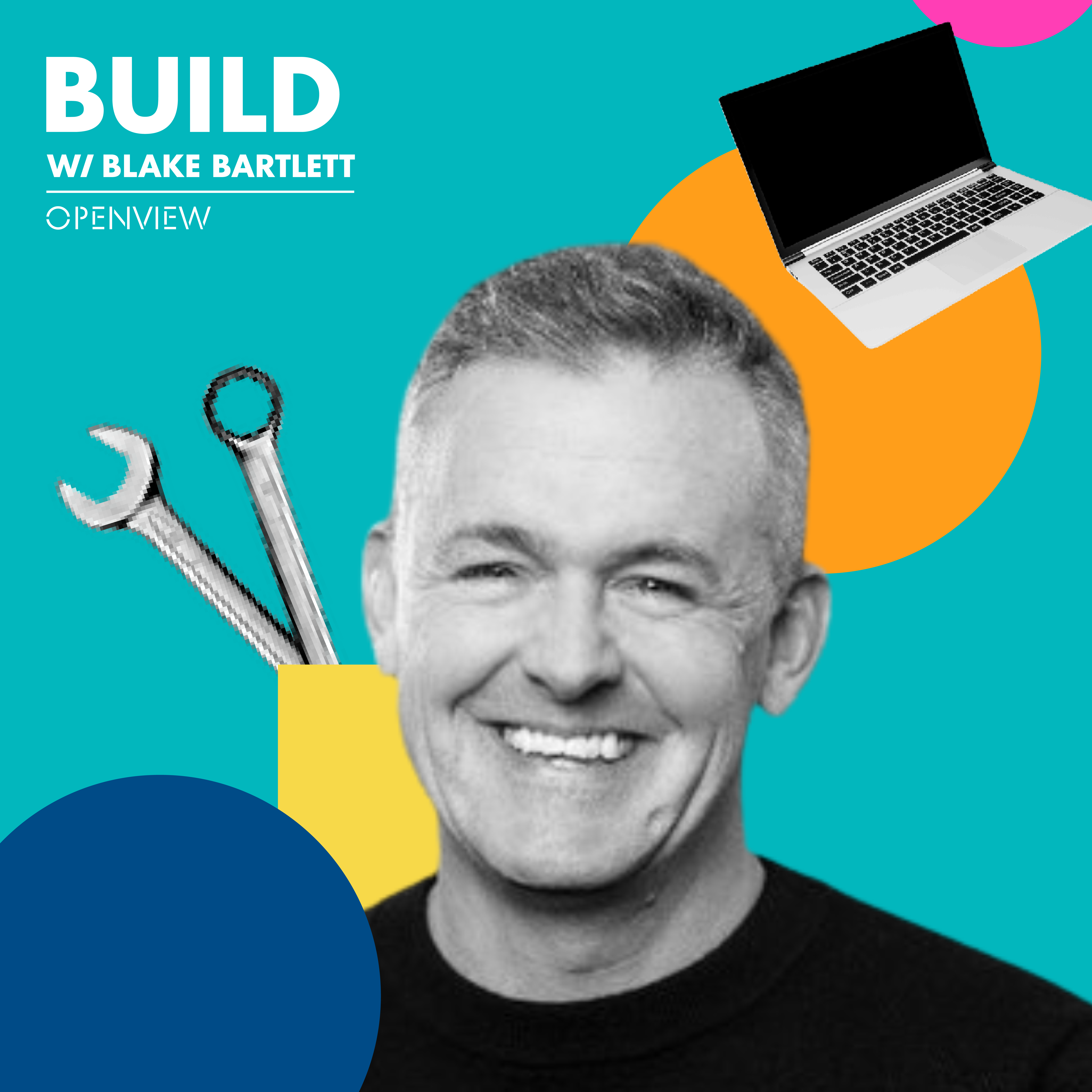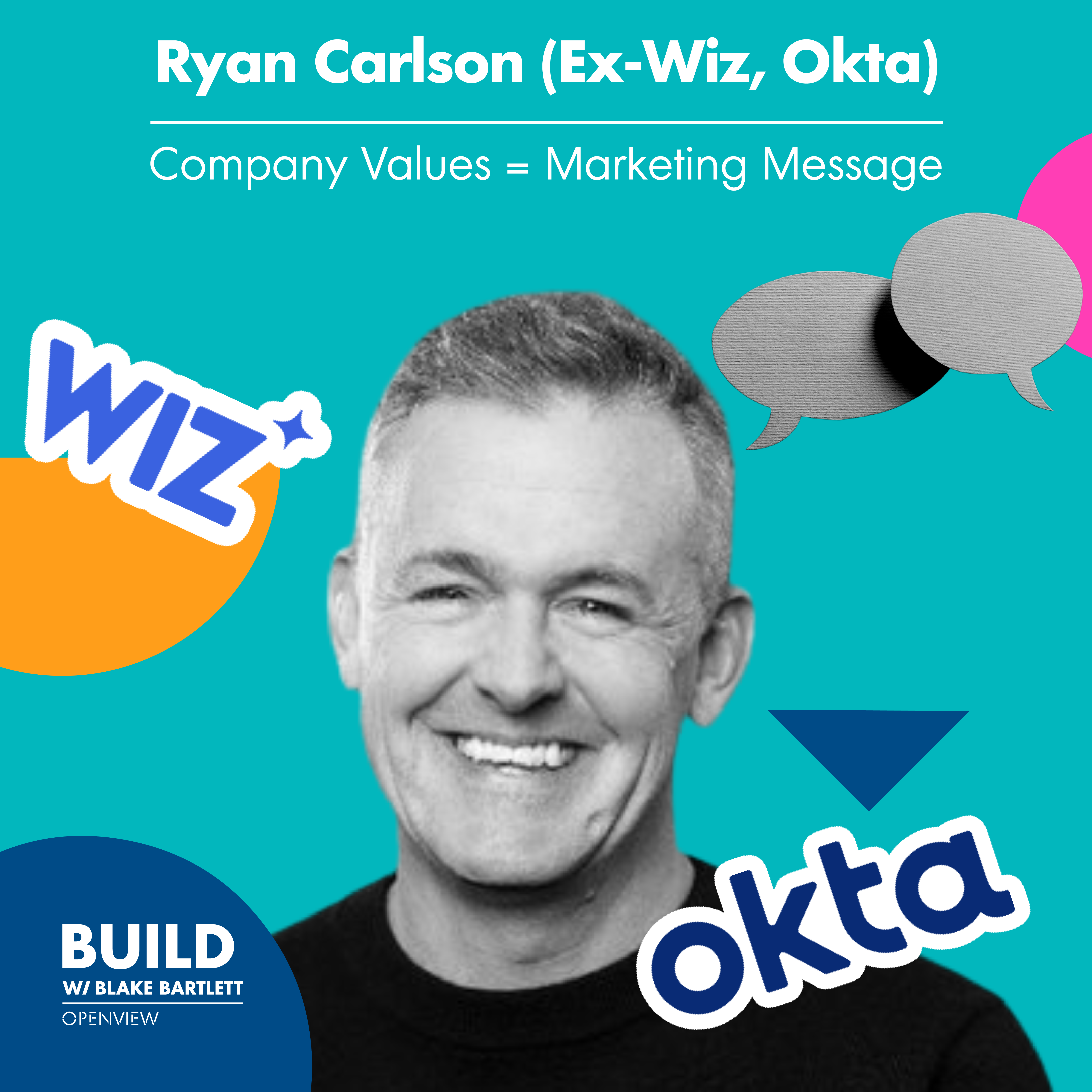Cliff Weitzman (Speechify): The Value of Building a Personal Brand and Audience as a Startup Founder CEO
- 0.5
- 1
- 1.25
- 1.5
- 1.75
- 2
Cliff Weitzman: It made me realize that creating value is like magic. The world is not a zero sum game. It is a plus sum game. So I changed my goal. It stopped being to be a billionaire, it was to create value. And so what are moments in your life that made you change your mind?
Blake Bartlett: Welcome to Build, the podcast from OpenView. I'm your host, Blake Bartlett, and the show features conversations with software founders, leaders, and investors. Each episode unpacks a new key insight on how to build your company and navigate the fast changing world of software startups. Personal brands are a hot topic these days, and for good reason. Social media has changed the game of influence for good. Today, people follow people, people listen to people, and people trust people. Corporate brands just don't capture the hearts and minds they used to. So now we're in a world where people Elon Musk or Bill Gates have many, many more followers than the companies that made them rich and famous in the first place. As marketers and leaders, we can choose the ostrich strategy and stick our heads in the sand while we pump out corporate social post after corporate social post, hoping that our company is going to go viral with the target audience, or we could lean into the personal brand movement and make it work for us. This is exactly what Cliff Weitzman has done as the founder CEO of Speechify. Cliff has been an avid YouTuber since he was 13 years old and he continues to embrace YouTube today, even as a busy startup founder. Cliff has an awesome channel that features videos on entrepreneurship, productivity and life hacks, and personal philosophy and self- improvement. Cliff has also made his personal story a big part of his YouTube channel. Cliff has been wildly successful in life, but he's had to overcome the challenges that come from learning differences like dyslexia and ADHD to get there. This is ultimately why he built Speechify in the first place, a text to speech service that will read anything on earth to you in seconds. It's probably the best and most inspiring example of a founder scratching their own itch that I've seen in 15 years of being a VC. Cliff's personal story is the story of Speechify, and he tells this story as often as he can, both to drive awareness of Speechify, but also to inspire people who have faced similar challenges with learning differences he has. So today we unpack Cliff's YouTube strategy. My biggest question was how the heck a startup founder CEO even has time to do two plus YouTube videos per week. He walks us through the exact playbook that he uses, and we take a deep dive into one of my personal favorite videos from Cliff, 28 Rules for Turning 28, a video and a life practice that he actually learned from Ashton Kutcher. This is a story and a playbook that you have to hear. So let's dive in with Cliff Weitzman. So you are the founder CEO of Speechify, a company and a product that is near and dear to my heart, but we're not actually going to talk as much about Speechify today. We're going to talk about something that you're doing on the side that actually relates to Speechify that I think is amazing and I'm a huge fan of, and that is YouTube. You happen to have a great personal YouTube channel, so maybe let's start with what's the channel all about, and what kind of videos do you post on there?
Cliff Weitzman: Sure. So I make videos about what it's like to be a CEO, what it's like to found a company. I have a lot of productivity tips and tricks. In the beginning I used to edit them. I realized that it's just doesn't scale. And so I have gone through a series of different editors and videographers that I've worked with. Ideally, you try to find someone who can both be a videographer and be an editor. It's difficult to do this. The way that my team structure today is as follows. Jack leads the video team. Jack comes to my house on Saturday and Sunday. We block out an hour and a half or two hours each Saturday and Sunday, we don't during the week. He comes with a script and we've brainstormed before and I'll try to shoot two YouTube videos and make 10 TikToks that are shot. Then that's integrated on a Dropbox. It's called Speechify YouTube videos. And we have editors in Italy, in Spain and the Philippines, and they will go edit those videos. They use a lot of stock footage to make the quality seem higher. We edit via a DSLR camera. One huge thing I realized recently is the importance of good lighting. So invest in$ 150 light that can shine on your face. One thing that is extremely important is the importance of redundancy with audio. So I always record with two microphones and it's amazing, at least 25% of the times one of the microphones is out, but one will not be out. And that's one form of content that we make. The second form, and that's what we call talking headshots. I'll do the intro, I'll talk about three points and then I'll give the conclusion. The other one that we want to do more of is more of vlog style. You know, introducing more of the team, showing me traveling more, bringing you into my life as a CEO. I think one important thing if you're going to be a creator is how can I give value to my audience? That's the thing that I always think about. But that's essentially the setup that when we have a release schedule, we know every video goes out Friday at 7: 00 PM and I'm not involved. So one thing that was very, very important, I don't review the final videos. If I'm involved in the process, I will block the process. And so the way that it works is the team edits the video, they put it together, they post it. Typically the first time I've seen the video is a friend of mine who is not me, not on the team is like," Wow, I love this video." And they'll send me the video. I never even saw this video before. If there's something that is a problem with the video, you know it's great. I own the media distribution channel, I can remove the video. I can retroactively do it, but it costs us because we've already exported, et cetera, but that's fine. And I've done it a couple of times and then we re- upload, but I don't want to be a bottleneck in the system. And so if you think about how, for example, Hollywood works, in this case, I'm the talent. I show up, the camera's ready, the audio's ready, the lighting is ready. The script is there. I sit, Jack tells me, say the following lines. I say the following lines and answer question, and then I'm good off the top. So I just will answer the question. That's it.
Blake Bartlett: Well, I think that definitely demystifies it a little bit, because there are people who are YouTubers for a full- time job, and then there are clearly people who are startup CEOs and founders as a full- time job. And so I think that's huge. And yeah, speaking to the types of content, I've seen a lot of the videos that are the more scripted style with the advice on career advice, life advice, productivity advice, but then started to see some of the more lifestyle ones coming in recently, like the house tour for the place that you guys rented in London as a team. And so super cool to be able to hear what's in your head through some of these thought pieces, but then also see what your life looks and sort of feel you're a part of the story. And so back to the audience, that both helps build the audience, but also connect with them to where they feel they know who you are.
Cliff Weitzman: Yeah. The other thing that is very critical is to have a little bug in your head is like, will this be interesting for someone? And so I do a lot of talks in schools. And so I always always make sure that I video those talks because they'll always have some nugget in them that is valuable. And by the way, I automate LinkedIn in a similar way. So LinkedIn, I've got, I don't know, 10, 000 plus followers on LinkedIn. Joe and our team post on my LinkedIn every single day. I don't write the posts. What he does is he takes the most poignant points that I make in my talks. And he summarizes them into LinkedIn format and he puts them on LinkedIn. He'll do the same thing on Twitter. And so you want to generate this content machine. So this is another thing that I actually am very good at. I will find creators that I think are really good. And I know that they're hustling on YouTube, but it's not the most lucrative thing unless you're Mr. Beast. I'll be like," Hey, you're so good at editing. You're so good at this. Would you contract with me?" And they'll be like," Yeah." And then I'll hire them. I've done the same thing on TikTok. So TikTok has a lot of very talented comedians and creators. So I've had a lot of Zoom calls with creators from TikTok and I'll have them review scripts with me and I'll try to hire them to come be professional comedians who work for Speechify, to help us make ads, to help us make content, et cetera. If you look at Marvel movies, for example, there's so many funny one- liners in Marvel movies, even though they're not comedy movies. If you think about Captain America goes to Robert Downey Junior, he's like," Take away the suit. What are you? Billionaire playboy philanthropist, whatever." There's all these great jokes. And so I'd love to have someone write the jokes for me. The more of it that you can abstract away the better.
Blake Bartlett: Let's talk about one of the videos and we'll unpack this, because I think this will give folks a sense of what's in store over at your YouTube channel. And I certainly love this one a lot. And so it was 28 Rules for Turning 28, because you just turned 28. So happy birthday, by the way. And I want to talk about some of the rules, because there was some really good ones in there. So unpacking some of them, we won't go through all 28 because we only have so much time today, but you should go watch the YouTube video. But the first one that I really loved was, was rule number five, which is, The ability to focus is undervalued. What's that one all about?
Cliff Weitzman: Recently there's been a podcast I really like, called How to Take Over the World. It summarizes the lives of a lot of really exceptional leaders. And I think a lot of the takeaways I have actually came from... I'll read a mini summary in the podcast and then I'll go read the 40- hour biography on Speechify. Download on the app store on Google Chrome. If you look at the lives of these people, they were just maniacal in their ability to focus. If you talk about Napoleon, he was famous for having the ability to compartmentalize his brain and he would close different drawers and open them. And if they were all closed, he's just asleep. It's especially focus over a long period of time. So if you consider me, when I was six years old, I saw a movie where Jackie Chan did a back flip, and I was like," Oh, I got to learn how to do this," and it took me until the age of 13 until I could do a back flip standing by myself. When I was nine, I wanted to read, and I was really bad at it. First, second, third, fourth grade, I was really bad at reading. I would still misspell my name even when I was 10 years old. I finished reading my first book when I was in eighth grade, but I wanted to be a billionaire, prime minister of Israel, and a pop star at the time. My dad started reading books to me, and then I found audio books and fell in love. I've now gotten good at reading, but I cracked it by figuring out how to build my own deep learning based software that would read anything to me. I solved the problem. And I think the trick is, if you find something that you're actually very passionate about, don't give up. It could literally take a decade. And it's hard to tell a 15- year- old or a nine- year- old, the thing that you need takes a decade because that's the equivalent to your entire life up until that point. Lincoln has a great line, you cannot fail unless you quit. And so if you focus on one thing and one thing only, and the last thing I'll say about this is when I was in college, I studied renewable energy engineering at Brown, and I built 32 products when I was in college. Everything from 3D printed schedule rates to iPhone apps and websites and payment systems. And I told myself, there's these varsity athletes next to me studying biomedical engineering. They go to practice. They do games on the weekends. I'm not a varsity athlete. So instead I'm going to go to hackathons on the weekends and pitch competition, instead I'm going to build. And now when I graduate, my focus is I have to focus on one thing because in life you don't make progress going in a bunch of different directions. You make progress by going in one direction over and over. And then you slam into a brick wall and you crumple against this wall. You pick yourself up, you go back and you smash into this wall again, over and over and over until the wall breaks. And then you keep running a little Mario and there's another wall and you crash into it until that breaks too. And that's how you actually make progress, especially in technology, is you break through the walls that other people stopped at. And the only way to do that is to make so much progress in one single direction that eventually you make the progress. So I, though I come up with so many new ideas, don't allow myself to work on anything that is not Speechify. And even if I have other passions or joys in my life, like music or acting or YouTube, I channel them in the direction of Speechify anyway.
Blake Bartlett: And another thing you said in the video that I loved is anytime you see somebody in the media or some sort of profile, usually it's definitely not somebody who just started doing that thing. They're not in the first year of just discovering this hobby. They're probably in years four or five, six at a minimum, because it takes that long to actually get good and get into a rhythm and sort of applying that focus over time. And so when you see somebody and the media always describes it as an overnight success story, and it never is. It's always somebody that's at least in year five of a really intensely focused effort.
Cliff Weitzman: That's right.
Blake Bartlett: Okay. So two more rules here again, you should definitely watch the YouTube video. There's 28 of them. There's actually a bonus one. There's a 29th one. They're all really good. My next favorite one is rule number 10, which is lead with love. So what does this mean for you? I guess both as a leader in a work context and also just more broadly in life.
Cliff Weitzman: Yeah, we have four core principles of speech before I actually just added a fifth one. So the four core principles are extreme product quality, frugality, speed, leading with love, and accountability. So what's leading with love? I'm the oldest of five kids, and my relationship with my siblings is the most rewarding part of my life. I believe that relationships are exponential, as in the quality of your relationships with your family, your best friends, your friends, your acquaintances, they become exponentially more important and give more value to your life. Above everything else, I think people most is to be loved, to be understood and people seek unconditional love. And when someone gets unconditional love, that's when you end up having really healthy humans, people who are happy. It, it actually is a direct cause of happiness. So I was very lucky to grow up in this environment. My favorite fantasy book is a book called Way of Kings. The main character, his name is Kaladin, and he's part of a slave group called Bridge Four. And he literally picks everybody up in that group from the bootstraps. He's the best leader of any character I've ever come across. So highly recommend reading the Way of Kings, but a lot of my leadership style comes from the leadership style of the fictional fantasy character Kaladin. So what does it mean to lead with love? I'll give you an example. We have a teammate who is currently in Miami. The rest of the team is in New York and I texted him," Hey we'd love to have you in New York whenever, happy to pay for your flights." And I just remembered he had a girlfriend and I was also happy to pay for your girlfriend's flight to come visit us. Now for me, the ability to work with this guy in person is exponentially high, put into tens of thousands of dollars. So it's a no brainer to pay for his flight. Most CEOs would not think to suggest to pay for the flight of his girlfriend. Now his girlfriend, I know, is visiting from Mexico and does not have the ability to pay for flights. So I removed the awkward conversations from them and something that could potentially stop him for coming to join us. I at this point have personally filed for green cards, O- 1s, J- 1s, B- 1s. So many different visas to get people into the United States, partly because I want to work with people in person, but mainly because I really care for the people that work with me. It's just going above and beyond, not because I have to, but because I care. So I treat my team in the same way that I treat my siblings, I just really, really care about them. And that doesn't mean that you don't deliver results. if you don't deliver results, if you're not responsive, if you don't take initiative, you won't stick with the team, but I'll still love you. And I still care about you. And I think that makes for a much more enjoyable life. And this is also why a lot of the leadership team for Speechify live in the same house, et cetera, et cetera.
Blake Bartlett: And there's other rules that nicely correlate to that. You mentioned one where subsidize a younger person to go on a trip. And so very similar to that is the example you just gave of buying somebody a plane ticket to come and be with the team and also their significant other. There's another one that's believe in somebody before they believe in themselves. And these are directly related, but they're also more specific and certainly instructive to this idea of leading with love. And I definitely think that there is a huge opportunity for more of this, rather than just leading with just the stick or just hype, but actually caring about the human on the other side of the equation.
Cliff Weitzman: That's right.
Blake Bartlett: So last of the four rules we're going to touch on today, rule number 22, which is speed is critical. What's that all about for you?
Cliff Weitzman: All right. So for Speechify, speed is used as a primary business strategy. In VC, we talk about the importance of moats and network effects and all these things, and those are very important. But the most valuable one is just run ahead of your competition by a lot. Make the distance so large so they could just never catch up to you. And this is basically one of the things we've very successfully done at Speechify. Speechify basically doesn't have... Not basically. We do not have any direct competitors and it's because it would be so difficult for anyone to catch up to us at this point. And not only are we so far away, we're also still moving so fast that it's just hard. And the company that I think has done this the best it is Stripe. Stripe doesn't have an inherent network effect. If I use Stripe on your website, it's not it makes it easier for me to use it on another website, but they have this concept of shaving yaks. Do things that other people are not willing to do. And they just shaved so many yaks that nobody else was able to compete. So this is exactly what we did in Speechify. This is why we have a great AI team, software engineering team across literally five different platforms, API, performance marketing across all these things. We just shaved a lot of yaks. That's number one. Number two is let's go back to history. If you look at all of the most powerful, successful world leaders in the history of the world, they're all obsessed with speed. Alexander the Great marched his people faster than all the other generals at the time. It's why he won. Napoleon, famous for marching his people faster than everybody else. It's why he won. Even when he ate, he ate fast. The same is actually true of Elon Musk. And you see it just over and over and over so consistently. My favorite example of this is there was a study done where this teacher for an art class gave his students, he broke the class into two categories. One is they make clay pots and one class made one clay pot. The entire year. They got to work on that clay pot every single day. The other class had to make a hundred clay pots, one new clay pot every single day. External people came to evaluate the pots at the end of the day and universally, every single one of the winner pots were from the category of the people who made a hundred pots. The volume of work matters. It makes you better. The same is true for YouTube videos, volume of work. You can make 300 YouTube videos and no one is smart enough to tell you which video will succeed. Same thing for SEO articles, same thing for performance market marketing creative. You just got to do a large volume of work. One of them will succeed. Speed, again, ties completely into this concept of if you're going to slam into so many brick walls, you might as well slam fast because if you slam slow, you won't succeed in slamming through enough brick walls because it takes that many at best. A more micro example of this is, again, I'm extremely dyslexic. I read very, very slowly, but I found a way to consume information fast by listening to 700 words per minute with Speechify, while most people read a 200 words per minute. But I didn't stop there. I can also touch type extremely quickly. I touch type 110 words per minute. My brother Tyler touch types 140 words per minute, and I'm very jealous that I can't do it. One day. But the importance is the reduction of friction makes it so I shoot more emails out every day, more Slack messages. And I don't feel lackadaisical or lazy because of the speed. So I optimize for speed. Especially for an ADD brain, that works really well.
Blake Bartlett: One very tactical example that I know I've seen you do in real life is, and I think you described it this way to me, which is if there's something to do and you can do it right now, do it right now. Don't wait. And so responding to an email is a perfect example. I'm very terrible at this. I'll see an email and be like oh, that's a one line email. I know the response to that, but I'm doing something else right now. Move on, come back later. Three days later, I still haven't responded to this one line email. And so I need to practice and channel your speed practice a little bit better here because yeah, just not wasting time, not putting it on a to- do list. If you can do it now, do it, get it done and move on. And that is this key to the hundred pots versus the one pot is like, don't sit and think about it, just do it.
Cliff Weitzman: And so a very, very special story I once heard, is there was an investor who succeeded in investing in Facebook when Facebook was the hottest company and the way that she did it is she got Mark Zuckerberg's IM messaging. And so she had the ability to just text him at the time where this is how people texted and that's why she got in the round, because she had the ability to communicate faster. And that's just so key.
Blake Bartlett: The other thing that this reminds me of is I think of it as being attributed to Reid Hoffman, but it might be from somebody else. But the classic line that if you aren't embarrassed of the first version of your product, you waited too long to ship it. And product can be substituted for anything, really. So even back to where we started with YouTube and folks that are listening right now probably know that I do a lot of content as well, both the podcast, I do video stuff. And I look back at the original videos I did two plus years ago, and they are extremely cringe- worthy. And even when I was making them in the moment, I knew that they were kind of cringe- worthy, but you have to start somewhere. And then guess what? I make multiple videos every single week. I've been doing it for two years and it's not cringe- worthy anymore. Hopefully two years from now I'll think that it's cringe- worthy because I'm improving so fast. But if I had waited to try to be perfect and try to be a great YouTuber, try to be a great video person, or a perfect podcaster before we ever do your first interview, you're just never going to get there. And then also the way that you get good is through practice and that's the high volume of work to create the luck for yourself.
Cliff Weitzman: Exactly.
Blake Bartlett: So in closing here, if somebody says, all right, I'm turning 30, I just turned 37, or if somebody's turning 21 or whatever it is. And they're like," I want to write my own rules for my age, but I've never done it before. And I also don't fancy myself a philosopher. Where do I begin? How do I start?" So what advice do you have for somebody?
Cliff Weitzman: Great question. I've now seen maybe 25 different people do this exercise since I put out that video. So the first thing you should do is go to my Instagram, @ cliffweisman. com, C- L- I- F- F- W- E- I- T- Z- M- A- N, if you're dyslexic. And I have both posts, both from 28 and from 26, you can just see it written out there. Number one, start with an emoji. It makes it really easy to read. I actually love formatting all my documents with emojis. Number two, make it short, make it one sentence. Don't make it a paragraph. And so I think that the value here is there is clarity in brevity. And if you can achieve that's really important. Number three or four, say something that other people won't say. Unless some people will disagree with the sentence, do not write the sentence. So one line I use that I love is treat the airport system like the subway system, or if you need to drive for two hours to hang out with people, do it. Those are easy things to say, no, you should not behave in this way. And so look for things that are controversial, because those are the places where you're going to win compared to others. And often it has to do with your personality. I'm just very extroverted. I'm very Spartan, I love to sleep on an air mattress or a couch. And I hate slowness. There's other people who are completely the opposite of me. They to have their house set up nice, steady. I'm the antithesis about that. So brevity, polarizing, and then draw. The other thing you could do is sit down and write 50 wishes, the 50 things you would want the most, and then go through the exercise of make three folders and put the wishes into the folders. And then what's the name of each one of the folders. That'll give you the top three goals in life. So figure out what your top three goals in life, and you can have a lot of rules that apply to how to achieve those things or why you want those things. Consider stories or themes that you see across a lot of the people that you admire. One thing I love to do is have a Google sheet of the 100 people in the world, alive or dead, that you admire the most, and why you admire each one of them. The rows are the names of the people and the columns are the categories of why you admire them. Artistic ability, speaking ability, leadership ability, whatever, philosophy. And then identify where are the clusters of why or where you find people inspiring. Last, I would say, what are things that made you change your mind? There was a point in my life where I wanted to be a billionaire and that changed to I wanted to create value in the world. And it was from an essay I read by Emerson called On Wealth. And he wrote about Thomas Avery, who invented the steam engine with a bunch of scrap metal in the floor of his garage. And he applied it, sought the matter, rearranged in a certain way and created something that was greater than the sum of his parts. And then he multiplied it at the times, times one, times 100, times 10, times a million and electricity and pump water out of wood, all this stuff. It made me realize that creating value is like magic. The world is not a zero sum game. It is a plus sum game. So I changed my goal. It stopped being to be a billionaire, was to create value. And so what are moments in your life that made you change your mind? Those are often really good rules.
Blake Bartlett: Ultimately, back to the idea of speed is critical and don't be too precious about it. There's no right or wrong answer here. And so start. Put something down, it could be three rules it could be five rules and then revisit it. I think one thing I really love from the video, the bonus rule, rule number 29, is every time you're on a plane, rewrite these things. So don't overcomplicate it, don't think you have to solve all the world's problems with this. Just get something down. Then yeah, I think the tools and the reflections, the inspirations that you gave are super good.
Cliff Weitzman: A lot of these I do while driving. And so I'll do this, I'll say," Hey, Siri, start a new voice recording," and he'll start recording. And then I'll speak into my phone, all the rules that I can think of at that moment, and then I'll use Otter or something else and I'll transcribe it and then I'll have the rules. The other thing I'll say is," Hey, Siri, make a new note." And then I say the name of the rule. And then when I'm back I'll recompile it. So that works really well.
Blake Bartlett: Well, Cliff, this has been awesome. I highly recommend, as I have multiple times throughout this, go check out Cliff's YouTube channel, subscribe to it, check out this video, specifically, 28 Rules for Turning 28. Write your own rules, and then also consider some of the thoughts here in terms of what would it look for you to build out your own personal brand platform, and how can you use some of the principles of leverage and some of the life hacks that Cliff has shared with us today? So thank you so much for joining us. This has been awesome, Cliff.
Cliff Weitzman: Same here, Blake.
Blake Bartlett: Thanks for checking out Build. If you enjoyed the conversation today, make sure to subscribe on your favorite podcast platform and leave us a review so that others can find the show as well.
DESCRIPTION
Cliff is the Founder CEO of Speechify. He’s also a “full-time” YouTuber, with an awesome channel that features startup advice, life hacks, and self-improvement philosophy. He explains the why and how behind his personal brand strategy on YouTube, and we dive deep into one of my favorite videos of his, “28 Rules for Turning 28.”
Key Takeaways:
- [02:45] Meet Cliff, CEO of Speechify, and his YouTube channel
- [06:31] Connecting with an audience, and thinking "will this be interesting to someone?"
- [08:15] 28 Rules for Turning 28
- [12:27] Rule #10: Lead with Love
- [15:55] Rule #22: Speed is critical
- [21:36] How to begin writing your own rules for your age
Mentioned in this episode:
Sign up for OpenView's weekly newsletter
Cliff Weitzman, Founder & CEO of Speechify
Cliff's YouTube video, 28 Lessons for Turning 28
Subscribe to Blake Bartlett on YouTube.
Podcast produced by OpenView.
View our blog for more context/inspiration.
Today's Host
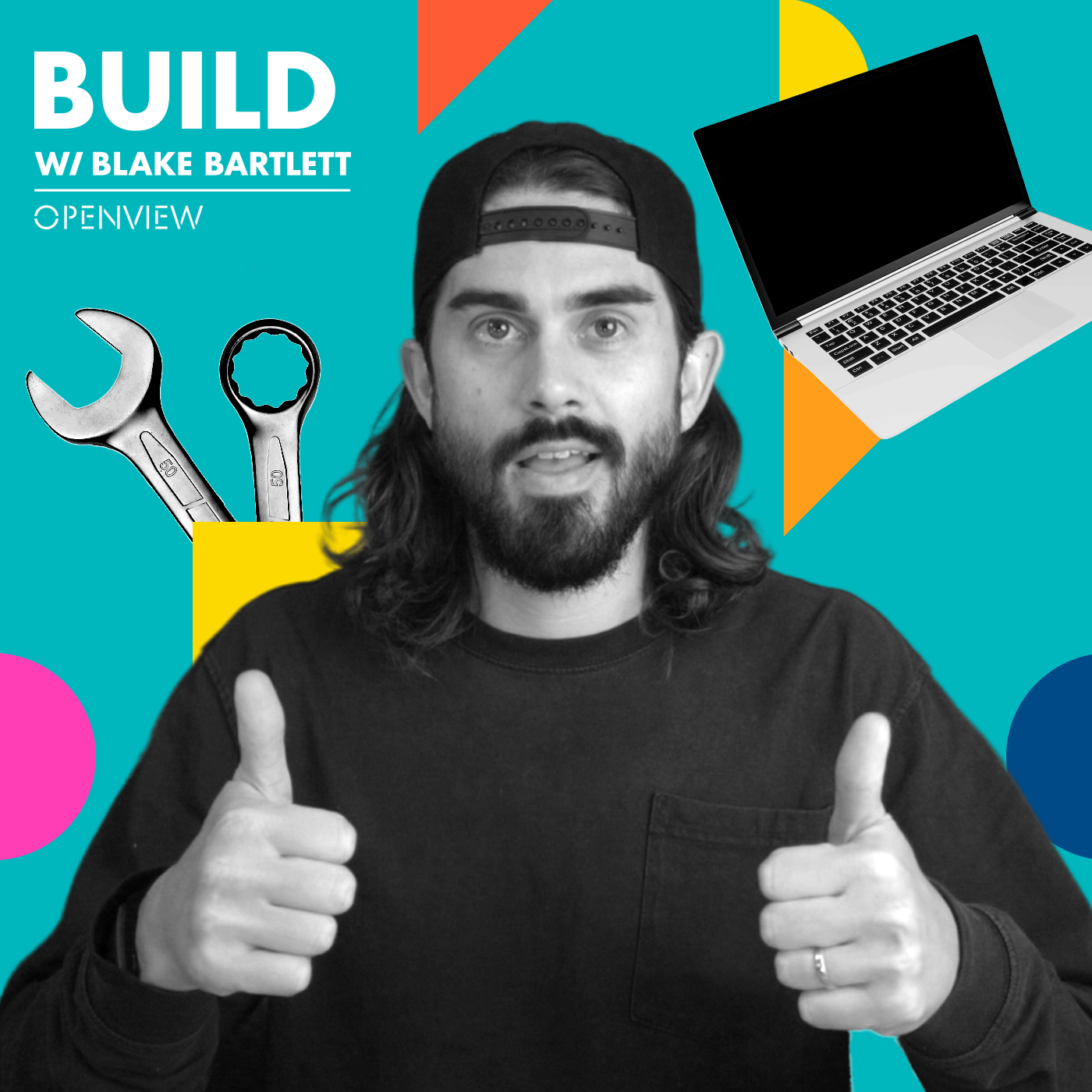
Blake Bartlett
Today's Guests
